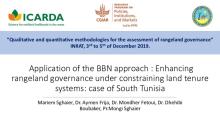Land Library
Welcome to the Land Portal Library. Explore our vast collection of open-access resources (over 74,000) including reports, journal articles, research papers, peer-reviewed publications, legal documents, videos and much more.
/ library resources
Showing items 1 through 9 of 676.The paper critically engages with sustainable development goal targets (SDG-2- Target 2.3; SDG-5) to examine how and why large-scale agricultural land acquisitions modify the social relations of women’s food access.
This policy brief provides details of the United Nations Special Rapporteur recommendations regarding how governments can upgrade informal settlements within a human rights-based framework.
Despite an inflow of investment in rural communities, there are concerns about negative impacts on local people’s livelihoods, access to farming land, productivity, income levels, food security and access to social services.
The local cost-effective, raised-bed machine for small-scale farmers has been developed by ICARDA and its national partners to promote the adoption of raised-bed technology at a larger scale.
The movement to secure women’s land rights in Senegal needs to take into account the rights of all sections of the targeted communities. Hence, the cases presented testify to specific situations along with evaluations of initiatives targeting improvement of women’s land rights.
The presentation discusses the application of the Bayesian Belief Network (BBN) approach to enhance rangeland governance under constraining land tenure systems in the South of Tunisia.
This report summarizes the implementation activities, “policy intersections” and the subsequent production of a draft model Land Use Bill (LUB, 2018) for Nigeria.
Government intervention and local level coordination of large-scale investment decisions are important components required for positive impacts on food security, nutrition and livelihoods of host communities.
This Template is designed for standardized description of Sustainable Livestock Management Options by Context (SLiM OxC), in which sustainable livestock management option and its social, economic and ecological contexts are systematically characterized.








